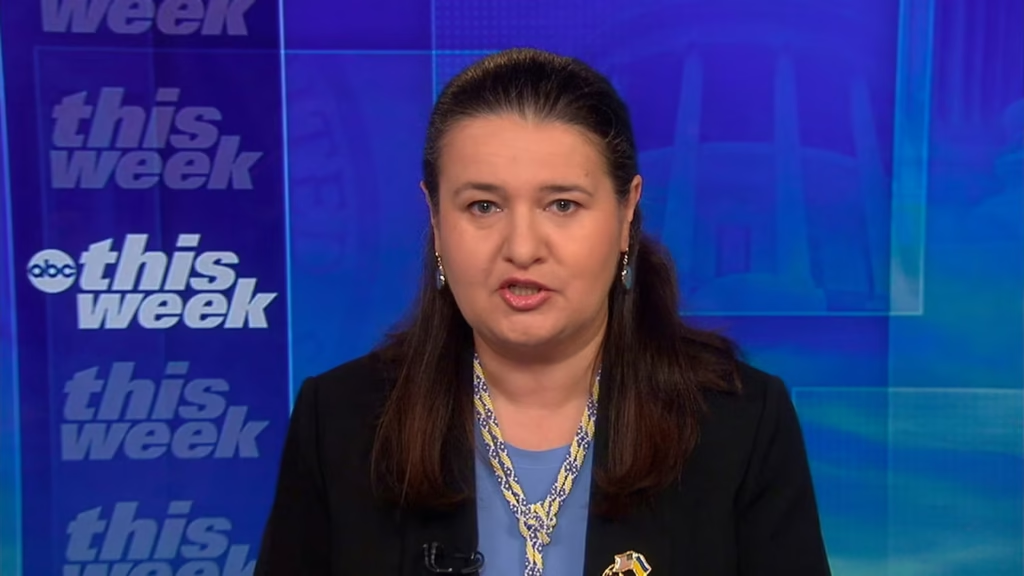Ukraine’s Ambassador to the United States, Oksana Markarova, expressed frustration and hope in equal measure on Sunday regarding the ongoing war between Ukraine and Russia, especially in light of Russia’s refusal to accept a 30-day ceasefire, which Ukraine and European leaders had collectively demanded. Markarova, appearing on ABC News’ “This Week,” responded to questions surrounding Russian President Vladimir Putin’s latest dismissal of the ceasefire offer, chalking it up to the same intransigence that has characterized Russia’s actions since the war began in 2022.
Markarova was adamant that the ongoing conflict was one-sided in terms of the desire for peace. “We have heard loud and clear from President \[Donald] Trump that ceasefires should be full and unconditional. And we have heard from other European leaders,” she said, making it clear that Ukraine was not only ready for peace but had long been pushing for a resolution to the war. The ambassador’s remarks underscored a continued unity among the United States and European leaders, who have called for a ceasefire with no preconditions.
The situation in Ukraine remains dire, and Markarova reiterated the suffering that her country has faced as a result of Russia’s invasion. She explained that Ukraine’s position had always been clear: the country is ready for negotiations and peace talks but emphasized that such talks must begin with an immediate and full ceasefire. “Nobody wants peace more than Ukraine,” she said, highlighting the frustration that Russia continues to prolong the conflict. “The question of the day is whether Russia wants it.”
The continued conflict and the refusal of the Russian leadership to engage in meaningful peace talks have left many in the international community wondering what it will take to end the war that has wreaked havoc on Ukraine’s people and its infrastructure. Despite Ukraine’s willingness to negotiate, Putin’s recent actions have only intensified the situation. In a response to Ukraine’s calls for a ceasefire, Putin instead offered direct talks to take place in Turkey, an offer that Ukraine quickly rejected, insisting that a ceasefire must come first before any negotiations take place.
In a statement made on Sunday, Markarova echoed the sentiments of Ukraine’s President Volodymyr Zelenskyy, who had previously said that Ukraine was “ready to meet” with Russia, but that such a meeting could only happen if a ceasefire was implemented first. This sentiment was reiterated by U.K. Prime Minister Keir Stamer, who on Saturday called out Putin for his continued refusal to engage in peace talks. “All of us here together with the U.S. are calling Putin out. If he is serious about peace, then he has a chance to show it, now,” Stamer said, adding that Putin did not require any conditions when he called for a ceasefire in the past for his own military parades, so there should be no reason to add conditions now.
Markarova’s comments reflected a broader disappointment with Russia’s leadership. “Any day potentially could be a great day,” she said, referencing Trump’s optimistic comment about the potential for peace in the region. But she placed the blame squarely on Russia’s shoulders, saying, “The onus is on Russia to accept the latest ceasefire proposal.” She emphasized that Ukraine was ready to move forward and end the violence, but it could not do so unless Russia took the necessary steps to halt the fighting.
The ambassador’s remarks were not just a reflection of the Ukrainian government’s frustration with Russia’s actions but also a clear message to the world: Ukraine is willing to negotiate, but it will not do so at the expense of its sovereignty and the lives of its citizens. This position has remained consistent throughout the war, even as Ukraine has endured immense loss and devastation. Markarova’s words reinforced the idea that peace is possible, but it must come with genuine commitments from Russia to end the violence.
The situation has been further complicated by the shifting rhetoric from top U.S. officials. After the now-infamous February meeting in the Oval Office between President Trump, Vice President JD Vance, and Zelenskyy, U.S. officials have become more vocal in their support for Ukraine. Trump, in particular, has expressed skepticism about Putin’s intentions, questioning whether the Russian president was “tapping \[him] along.” The U.S. administration, which once focused on providing limited support for Ukraine, has increasingly shifted its stance to favor a stronger and more consistent commitment to Ukraine’s sovereignty and security.
Vance, who has played a key role in shaping U.S. foreign policy regarding the war, added his voice to the growing chorus of officials expressing frustration with Putin. In a statement made last week, Vance said that Russia was “asking for too much” in the negotiations. This sentiment was echoed by U.S. special envoy Keith Kellogg, who called Putin an “impediment to progress.” These statements highlight the growing impatience within the U.S. government with Russia’s continued obstructionism in peace efforts.
While U.S.-Ukraine relations have not always been smooth, particularly in the aftermath of the infamous meeting in the Oval Office, Markarova pointed out that the focus has always been on working together for the common goal of a peaceful and prosperous Ukraine. “We always focused our discussions on what can we do together as strategic friends and allies,” she said, emphasizing the long-term nature of Ukraine’s partnership with the United States. The recent signing of a comprehensive economic partnership agreement between the two countries, which aims to create a reconstruction fund for Ukraine, underscores this ongoing collaboration.
Despite the tension that has marked some aspects of the relationship, Markarova made it clear that the alliance between the U.S. and Ukraine remains strong. “Sometimes friends can disagree. But that’s disagreement among friends,” she said, underscoring that the ultimate goal of both Ukraine and the U.S. is the same: a sovereign, secure, and prosperous Ukraine. This sentiment, echoed by other European leaders, speaks to the broader unity that exists between Ukraine and its allies, despite the challenges and setbacks the country has faced.
The call for peace and an end to the war in Ukraine is not just a political issue but a humanitarian one. The devastating toll that the conflict has taken on Ukraine’s people, infrastructure, and economy cannot be overstated. The need for an immediate and lasting ceasefire is critical to providing relief for the millions of Ukrainians who have been displaced or affected by the war. It is also crucial for the future of the region, as continued violence only perpetuates instability and suffering.
As the world watches and waits for Russia to make a decision, Ukraine remains steadfast in its position: peace is possible, but it must come with a full and unconditional ceasefire. The continued pressure on Russia to meet this demand is not just a matter of diplomacy but a call for justice, stability, and the protection of human lives. As the situation unfolds, the international community must remain vigilant and committed to supporting Ukraine’s right to peace, security, and sovereignty.
The future of Ukraine and the broader international order depends on the actions taken in the coming days and weeks. Whether Russia chooses to accept the terms of peace or continues its aggressive stance will have far-reaching implications not just for Ukraine but for global stability and security.



